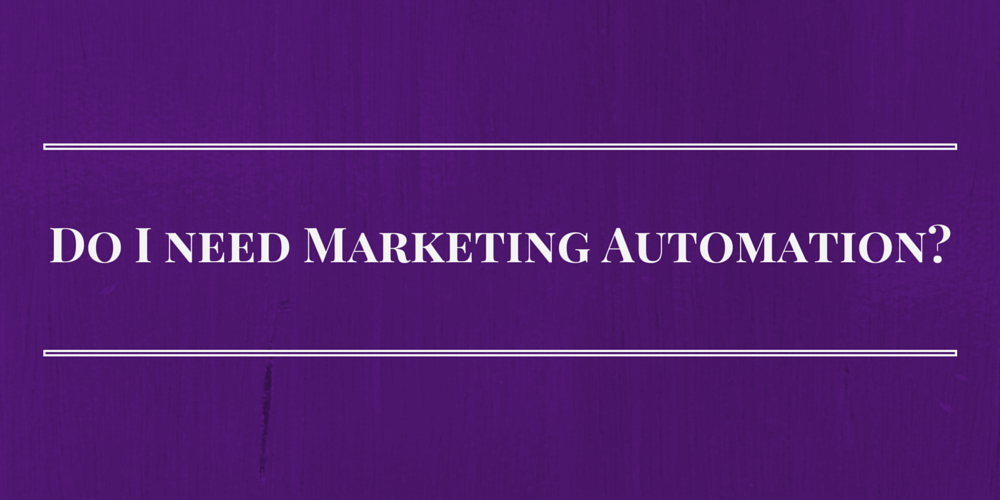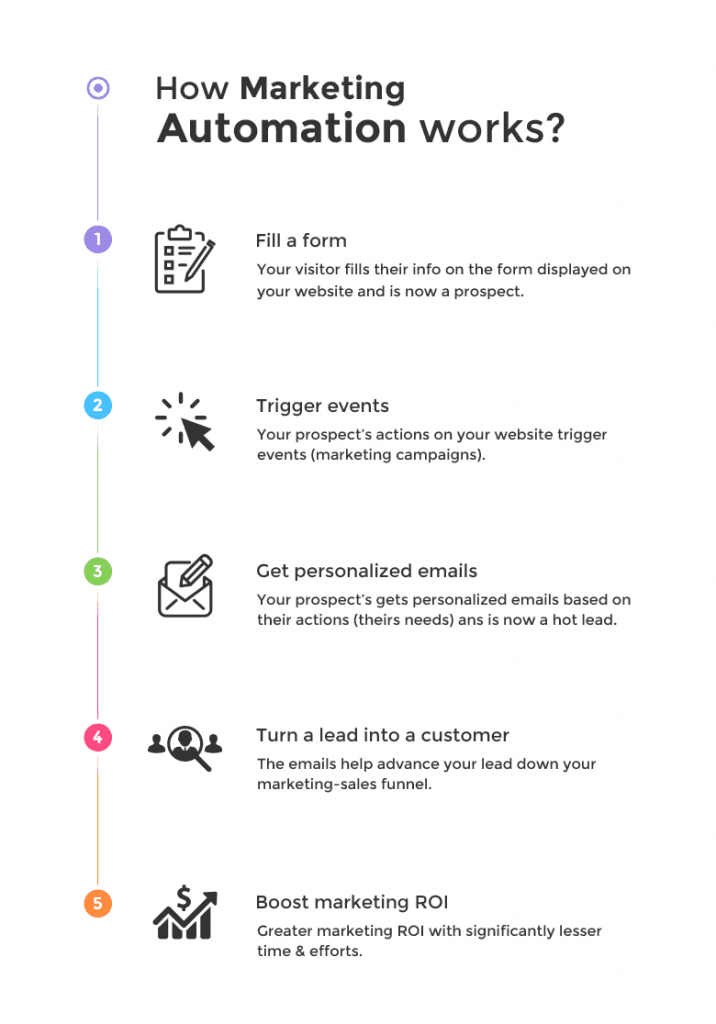Marketing Automation is the shortcut to becoming your company’s growth engine. That’s right.
Marketing automation software helps you perform repetitive tasks involved in marketing effectively and efficiently. It significantly reduces your marketing time and expenses and remarkably boosts your lead conversion rates. Take a look at the illustration below to see marketing automation in action.
We know that’s quite impossible to be the right solution for everyone. A product that tries to sell to every single person in the world ends up selling to no one. There’s a whole marketing and business theory about this (see Positioning for starters).
Our goal here is not convincing you that you must start using Marketing Automation, but to clarify that some businesses can use it and be successful with it.
We will focus on explaining why SMBs and B2Bs can benefit from Marketing Automation and also that there’s a good reason to graduate from Email Marketing to Marketing Automation with an interview with one of our customers: an Email Marketing startup.
Do SMBs Need Marketing Automation?
Don’t be fooled into thinking that Marketing Automation is only for huge companies as an enterprise solution. Nowadays, in the market, there are different tools offering email automation and Marketing Automation for SMBs. Why’s that?
According to a study from Gleanster around 20k-30k small business (of 21M) adopted a Marketing Automation solution. From the SMBs that invest in it, small companies reported an improvement on lead quality and pipeline growth within 6 months and mid-to-large companies report an average of 12 to 18 months.
But how can you tell if your SMB will get the same results?
Let’s say you’re a small 10-member consulting firm with a website and a couple of blog posts in place. Your website includes a Contact Us form that captures essential personal information of your visitors and you have some forms to collect emails from people who want to get updates about your blog posts.
You also have an email list with potential contacts. Your business is getting a good amount of leads and you feel you can be more effective and smart in contacting them.
Enter marketing automation:
- It notifies your potential contacts as soon as your blog post is out;
- It captures your leads (the ones who filled your form) and categorizes them as per their needs and level of engagement (segmenting);
- It sends your leads more emails (personalized ones based on their behavior/preferences that were captured with an event tracking feature) to increase their awareness and interest towards your merchandise (lead nurturing);
- It gauges the reaction of your lead to these nurturing emails so that you know when the time is right to make a sale and convert your lead into a customer (lead conversions through nurturing campaigns).
Even if your company don’t fit this example, you can imagine situations where it would be better if you could send the smartest communication possible to engage with your leads and customers. Marketing Automation will help you with that.
Do B2B Companies Need Marketing Automation?
I think B2B companies are a perfect match for Marketing Automation solutions. Usually they have longer sales cycles. Companies tend not to buy things without putting effort in researching and the decision passes different job roles.
Now let’s say you’re a B2B with all the above-mentioned resources. In addition, you have a Sales team that’s selling your products and services.
Since you are a B2B, your website visitor isn’t going to buy what you’re offering right away, because this isn’t a simple e-commerce transaction. In fact, they might visit your page several times, browse through it, and then make an informed decision.
Enter marketing automation:
- It captures your visitor’s profile and provides you information about their behavior on your website, the actions they took, etc. as well as their preferences;
- Your marketing team can create campaigns to send content they create to help the decision makers choose your product. This will nurture and qualify the leads within the sales and marketing funnel until they are ready to buy;
- It arms your Sales team with information such as: What brought your visitor to your website? Who are they? What interactions they’ve had with you so far? Where are they on your marketing-sales funnel? Should I start sending them sales pitches?
With this information, your Sales team knows exactly what needs to be done to convert this lead into a customer. And it doesn’t stop there. It helps them build a solid relationship with your customers so that they keep coming back to you.
Do I Need Marketing Automation? Isn’t Email Enough?
In the examples above you could argue that some Email Marketing tools could solve the communication problem, but there are certain key differences.
Email marketing helps you create email campaigns for your email list and gives you reports/analytics on the performance of these campaigns. You should opt for email marketing if all you need to do send weekly newsletters to your contacts.
If you need to capture leads and their behavior, create nurturing campaigns, integrate with third party services to procure your contact list … then you need marketing automation. To find out more about the benefits of marketing automation, check out one of our previous posts.
To help you see the difference between the two, we’re going to take a look at one of our user cases.
Case Study
One of Route’s clients is an email marketing startup. So, we asked them why they chose to use a marketing automation tool like Route.
Q: Why did you need a marketing automation tool?
With our email marketing solution, we could set up email campaigns and see how they fared through our detailed reports. However, there was no way of finding out what content our users needed, or where are they within the customer lifecycle. We lacked resources to figure out what our customers needed to stay engaged with the brand.
Another problem was we had to invest a lot of time and energy in creating individual email campaigns as per our understanding of our target audience and our intuition.
Q: Intuition?
Yes, a large number of marketers use intuition – guessing what they think their customers will respond to. Hence, they send email content that’s based on pure guesswork, the result being unopened emails due to non-engaging content. Sometimes it works, but it involves huge cost to profit margins that could be avoided easily by using information on the customer – behavioral, transactional, social, demographic, etc. and creating content accordingly.
That’s why we decided we needed help and chose to start using Route.
Q: How is Route helping your marketing efforts?
With Route, we’re able to capture buyer behavior and accordingly create buyer personas and events (marketing campaigns) corresponding to each persona. We can create several campaigns at once and run them all at the same time – automation is truly a blessing. We are now able to nurture our leads – identify where a lead is right now on our marketing funnel, what are they looking for, and accordingly send content that satisfies these needs. Lead nurturing has significantly increased our conversion rates and led to a remarkable increase in our marketing ROI.
Q: What, according to you, is an indispensable feature of Route?
We believe that the heart of any marketing automation tool lies in setting up criteria for triggering events based on buyer behavior, browsing/purchase history, preferences, etc. Setting up these events takes a while, but it is worth the effort. Because this automates everything. All you have to do is sit back and let the software do what it’s meant to do. You receive great insights on what your target audience needs and create content accordingly. For us, content marketing is the crux of all our marketing efforts. Plus, you also get detailed analytics showing how these events fared, areas you need to improve, and you can tweak your events accordingly.
When Should I Graduate from Email Marketing to Marketing Automation?
We’ve compiled the features offered by email marketing solutions, in general, against the features offered by Route. Take a look!
| Feature | Email Marketing | Route |
|---|---|---|
| List management | Yes | Yes |
| Facility to segment contacts manually using filters | No | Yes |
| Lead nurturing | No | Yes |
| Event based marketing campaigns | No | Yes |
| Tracking visitor behavior through website events | No | Yes |
| Capturing visitor info through tracking forms without extra code | No | Yes |
| CRM, API & 3rd party integrations | Yes | Yes |
| Campaigns sending info to 3rd party services | No | Yes |
| Reporting and analytics | Yes | Yes |
| Mobile optimization | Yes | Yes |
If your needs are completely fulfilled by the features offered by an email marketing platform, then by all means, continue using one. However, should your needs exceed these and you require features offered by a marketing automation solution like Route, then it’s time for graduation.
Route offers several unique features that’ll greatly help your marketing efforts. Sign up for a free 30-day trial right away, no expenses/credit card required. Won’t hurt to just try, right? 😉
*This post was co-written with Ayswarrya Ganapathiraman.


